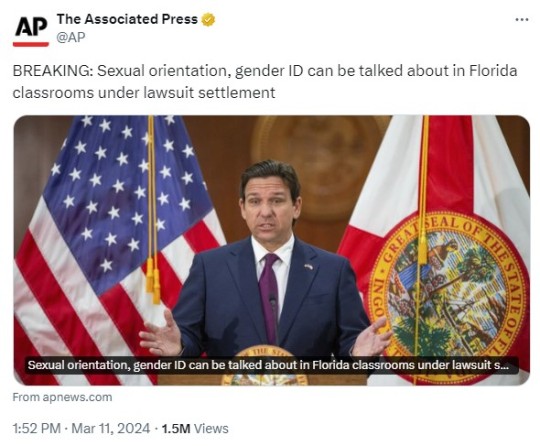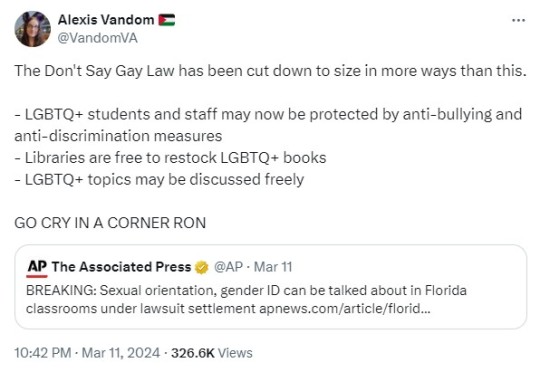#anti gay discrimination
Text
Oh, Republicans. What is this sick fantasy you have made up about children and litter boxes? Do you think people forgot how to Google?
#politics#maga me sick#republicans#litter box#lgbtquia2s+#lgbt#transgender#gay#anti gay discrimination#anti trans propaganda#propaganda
27 notes
·
View notes
Text
anyone else feel like the current pushback against the word “transandrophobia” EXACTLY mirrors the pushback against the ocean gay mlm flag from a couple years ago?
like, instead of “You don’t need your own flag! Just use the rainbow one! You’re stealing from lesbians!” it’s “You don’t need your own word! Just use the word ‘transphobia’! You’re stealing from transfems!”
#also the disgusting violent attitude is the same#like i remembering seeing ppl say they were gonna beat up people who used the ocean gay flag#and now i see that same violence towards ppl who use the word “transandrophobia”#only difference is that flag discourse is stupid and discrimination discourse is. literally denying discrimination#transandrophobia#anti transmasculinity#thankfully i’m seeing a lot more transfems in support of the use of the word “transandrophobia” these days#makes me happy#we are all siblings and we are all here together <3
81 notes
·
View notes
Text
Working in diversity and inclusion as a queer person who has been living and moving through queer spaces for half my life has shielded me from a lot of pain and suffering in some ways. I had places to vent, to express and to talk about my experiences. Because now I am in a cis-het world, with less queer people and all of a sudden people are so hesitant to talk and express experiences of discrimination.
It just dawned upon me that I have had a luxury to live and breathe in queer spaces, where my experience of discrimination has always been a non-negotiable fact. It was something that was frequently talked about and quite the relief. Now, seeing closeted queer people struggle to even put their experience of discrimination into words, is just so eye-opening, because they did not have the same luxury as I did.
I see you. I hear you. I am fighting to make your voices be heard.
#2024#discrimination#anti discrimination#diversity#inclusion#queer#lgbtiq#lgbt#queer spaces#experiences#gay#Trans#lesbian#homosexuality#transgender#bisexuality#bi
16 notes
·
View notes
Text
reportedly little kids are calling each other gay as an insult just like in the early 2000s now with the added bonus of calling each other trans as an insult
#queerphobia#queerphobic culture#the culture is bad. it is bad. schools need to crack down on discrimination and bullying#they never do#american education system#do better#transphobes#generational hate#hate has no place in educational facilities more than anywhere#hopefully i can one day be a speaker at schools and campaign against it#but like. come on. teachers and staff do BETTER. the kids dont know better so TEACH THEM#thats your JOB#istg they witness the kids harassing another kid and calling them gay/trans like its a dirty word and dont DO anything about it#stop hate#anti bullying#teach your children#not to fucking harass each other#it is heartbreaking that they don't have anyone teaching them kindness
13 notes
·
View notes
Text

March 21 - Truman Signs Loyalty Order
On this day in labor history, the year was 1947.
That was the day President Harry S. Truman signed Executive Order 9835.
It is commonly referred to as the ‘loyalty order.’
It required the screening of millions of federal civil servants and applicants.
9835 is considered one of the key preconditions for the rise of the McCarthyite Red Scare.
It established the criteria for investigation, review and dismissal.
These included a Loyalty Review Board, a master index of those investigated and definitions determining alleged disloyalty.
Disloyalty could mean sedition, espionage, or advocating revolution.
It could also mean membership or sympathetic association with movements considered totalitarian, fascist, communist or subversive.
Soon, the Attorney General’s List of Subversive Organizations was published.
It amounted to a black list.
In their book, The Fifties, Douglas Miller and Marion Nowack comment: “Between the launching of his security program in March 1947 and December 1952, some 6.6 million persons were investigated. Not a single case of espionage was uncovered, though about 500 persons were dismissed in dubious cases of ‘questionable loyalty.’ All of this was conducted with secret evidence, secret and often paid informers, and neither judge nor jury. Despite the failure to find subversion, the broad scope of the official Red hunt gave popular credence to the notion that the government was riddled with spies.”
President Dwight Eisenhower would revoke 9835 with his Executive Order 10450.
But this order dismantled the Loyalty Boards by transferring power to federal agencies.
It also expanded investigations to include those engaged in “immoral” or “disgraceful” behavior.
This included what it considered sexual deviance and led to the witch hunting of and discrimination against gays and lesbians in the civil service.
#Labor history#National Security Act 1947#Anti-Communist movement begins#mccarthyism begins#witch hunting of and discrimination against gays and lesbians in the civil service.#1950s history
10 notes
·
View notes
Text

Credit: GAY TIMES
17 notes
·
View notes
Text
A Statutory "Green Book" After 303 Creative
In 303 Creative, the Supreme Court held that at least in some circumstances a business's free speech interest in avoiding producing expression it disagrees with constitutionally must trump the application of anti-discrimination law in areas of public accommodation, notwithstanding the admittedly "compelling state interest" the latter type of law protects.
It was not so long ago that minorities in America had booklets they carried to let them know which businesses it was safe for them to patronize, knowing that in certain places and communities they could not simply assume that a hotel, restaurant, or shop open to the general public would be open to them. The Jewish Vacation Guide was one example, the Negro Motorist Green Book was another. In circumstances where discrimination was lawful, these resources served several important needs.
First, of course, they let their readers know where certain services simply would be unavailable. One does not want to travel through or move into a town where the only hotel or restaurant will refuse to serve you.
Second, and almost as importantly, they enabled readers to avoid shops which would refuse to grant them service. This is distinct from the first injury, because there is a severe dignitary harm in being refused service on account of one's identity even if a competing business across the street that will happily take one's dollars. One feature of public accommodations law is precisely that one doesn't have to "run the risk" that in entering a storefront on Main Street you'll endure the indignity of being asked to leave because you're the wrong skin color, religion, or sexual orientation. Absent that guarantee being fully enshrined into law, resources like the Green Book enabled travelers to know in advance which storefronts to avoid so they wouldn't have to face that sort of humiliation.
In keeping with that tradition, I wonder if one way of balancing 303 Creative's First Amendment protections with the again conceded-to-be-compelling interest in robust antidiscrimination protections is via the time-tested policy of disclosure. States can pass laws which require any business that wishes to claim a First Amendment exemption from all or part of an anti-discrimination statute to publicly announce and display that choice; and the state can likewise maintain a list of businesses which make such claims. The law would be a sort of statutory Green Book, letting patrons know what businesses are at least claiming an ability to discriminate (and by extension assuring them that businesses not on the list remain safe to patronize).
Here's my very rough crack at some model legislative language:
Sec. XXX -- Exemptions
(a) Registration. Any business which seeks to claim a First Amendment exemption from all or part of the [this state's anti-discrimination law] ("a business seeking an exemption") must, at least thirty days prior to asserting any claim for such an exemption,
(1) Register with the Secretary of State their intent to claim an exemption, including specifying which portions of the law they assert they will not comply with.
(2) The Secretary shall publish the names and addresses of all businesses who register their intent to claim an exemption under this subsection on a publicly available website, including which provisions of the law they claim exemption from.
(b) Public display. Within thirty days of receiving a filing under Sec. (a)(1), the Secretary shall issue a notification to the business seeking an exemption stating that "WARNING: THIS BUSINESS HAS FILED FOR A FIRST AMENDMENT EXEMPTION FROM THIS STATE'S ANTI-DISCRIMINATION LAWS", including specifying which portions of the law the business claims exemption from. Unless otherwise inapplicable, the text of this notification shall be conspicuously displayed in
(1) The front window or doorway space of any physical location of the business that is open to the general public or the businesses' regular customers; and
(2) The front page of any webpage or social media account controlled by the businesses and through which it advertises its business to the general public;
(3) Notwithstanding any other portion of this subsection, if a business claiming an exemption has neither a physical storefront under subsection (b)(1) or a webpage under subsection (b)(2), the text of the notification shall be displayed in any reasonable location where it will be conspicuous for the average customer considering patronizing the business.
(c) Presumption of sincerity. Any business which complies with the provisions in this section shall be deemed to have established, as a rebuttal presumption, the sincerity of their belief that compliance with [this state's antidiscrimination] conflicts with their own expressive beliefs.
(d) No entitlement to, or expansion of the scope of, exemption. Except as detailed in subsection(c), compliance with the provisions of this Section shall not entitle the business seeking an exemption from antidiscrimination law to any relief from the requirements of antidiscrimination provisions beyond that which is constitutionally required under the First Amendment; nor does it immunize the business seeking an exemption from any public or private proceeding seeking to enforce anti-discrimination provisions that would not otherwise violate the First Amendment.
The basic idea of this provision is simple: if you want to claim a First Amendment right to discriminate, you have to claim it publicly, in advance, so that people who would be denied service can plan accordingly. By creating a master list of discriminators, and by requiring businesses who seek to assert a right to discriminate to prominently display their intent on their storefront, it is far less likely that customers who would end up being excluded will on accident patronize the business.
The law would have some other salutary effects as well. By creating a reasonably comprehensive list of businesses asserting a right to discriminate, the state can learn of the existence of any "dead zones" where members of certain marginalized groups may be severely restricted or entirely unable to obtain services -- data that could be very useful for future legislative action. As reflected in subsection (c), the law also I think would aid in dividing the actual true believers from the opportunists -- I assume that only those who really, truly believe in their discriminatory impulses will be willing to announce in advance to the world "I am a discriminator" (as the 303 Creative plaintiff, to her "credit", was willing to do).
What are some potential drawbacks? One possibility is that it will be assumed that a law like this will enable more businesses to discriminate than otherwise would be licensed to do so by 303 Creative; I wrote subsection(d) to try and forestall that risk. Under this statute, registering a claim for an exemption is just that -- a claim, and the claim does not guarantee success. A business that registered but whose activities were not protected under 303 Creative's umbrella would still be liable, notwithstanding their registration.
Another possible problem is the argument that a law like this itself constitutes compelled speech. On face, the requirement that the business post the "WARNING" placard in its store to me doesn't seem any different than requiring a restaurant to display the health inspection notice. But there might be something different here insofar as the broader thrust of the statute would be to force businesses to "go public" with their intention to discriminate. While there's something instinctively odd about claiming a free expression right to avoid expressing one's deeply-held beliefs, there are circumstances where such a claim makes sense -- NAACP v. Alabama is the obvious template here. Alabama in the 1950s sought to require that the NAACP disclose the names and addresses of its members; the NAACP, unsurprisingly, did not wish to make this information public and claimed a First Amendment right to keep their membership data private. The Supreme Court ruled in favor of the NAACP (incidentally, NAACP was perhaps unsurprisingly a key precedent relied upon by the Griswold Court regarding the existence of a right to privacy). The NAACP had obviously reasonable fears that disclosure of their membership would render them vulnerable to harassment and violence; the discriminating businesses might claim fears of a similar vulnerability.
NAACP is clearly distinct, however, for a simple reason: the NAACP did not simultaneously seek to keep its "expression" quiet and claim that its expressive activity entitled it to a governmental benefit (I've always found the Little Sisters of the Poor style claim -- wanting an exemption, but also being outraged at being forced to actually ask for the exemption -- to be utterly ridiculous). With regards to its membership information, the NAACP truly wanted nothing more than to be "let alone"; there was never a circumstance where the organization would wield its membership data as a sword against the state. By contrast, by stipulation the discriminators do wish to go public regarding their beliefs when they tell the state "you can't enforce your anti-discrimination law against me because I believe X". At most, what they want is to be able to hide their beliefs until the last minute. But that's a far less pressing claim -- at some point, the business seeking the right to discriminate will have to go public with its claim, and so it does not seem unreasonable to insist that the pivotal moment occur before an unwitting customer is humiliated and denied service.
And on the subject of harassment: certainly, violence and vandalism are never justified. But often in this context, "harassment" means nothing more than a consumer counter-boycott -- the company refuses to do business with certain groups because of its beliefs; many other consumers decide accordingly that they will no longer patronize the business in protest of that discrimination (ex: the Jewish community members who no longer are purchasing from a Kosher bakery that decided it couldn't bake "pride" treats). That is not harassment, that's counter-speech. And in that register, I'd argue that under 303 Creative's logic enabling customers to know "this business asserts a right to discriminate" is free speech facilitative, not chilling.
One of the virtues of public accommodations law is that it dissipates, under normal circumstances, the inference that basic business transactions are expressive. I very much prefer a world where the bakery that bakes a cupcake for a client isn't seen as sending some sort of message of approval towards the client and the client that eats the baker's treat isn't sending a message of approval toward the baker (beyond "this cupcake is delicious"). That, to me, seems a far more pleasant space to live in than one where every turnip and widget we buy or sell can be taken as some sort of sweeping moral approval for our business partners.
But the Supreme Court did not agree. And once we open the door to saying that ordinary business transactions should be perceived as expressive, then customers as well as businesses have a strong interest in knowing the political and social views of who they're transacting with so they can assure themselves that values align, and can redirect their dollars where they do not. This is one reason I think a consequence of 303 Creative will be to supercharge "cancel culture" -- the more businesses are allowed to say "we don't serve your kind", the more customers must be allowed to say in return "well then we don't buy from your kind". The only thing worse than cancel culture is unidirectional cancel culture. If businesses can "cancel" customers for supporting gay rights, then customers should be equally empowered to cancel businesses for asserting a right to discriminate.
Again, the model language I've written above is rough. But I'm curious what First Amendment scholars and other interested parties think of the idea. We may have to tolerate certain businesses asserting a constitutionally-protected right to discriminate. But customers have rights too. One of those rights is to have confidence that one can walk into a storefront and be served as an equal. Another right is to be able to avoid patronizing businesses who insist they have a deeply held commitment to discriminating against you, your family, or your loved ones. This statute, it seems, can help bring these clashing interests into balance.
via The Debate Link https://ift.tt/9X0UOKh
26 notes
·
View notes
Text
#trans#trans man#trans masc#trump#fuck trump#anti trans legislation#united states#transgender#lgbt#queer#lgbtq#gay#trans discrimination#trans discourse
40 notes
·
View notes
Note
The bbc article on the history of pride said something like ‘recently there has been more focus on trans rights’ like yeah don’t we fucking know it
oh if only we could forget just for a second
#trans ‘rights’ bc most of it isn’t even about like. fighting for proper anti-discrimination laws#like how many trans ppl are fired or not hired based on being trans n have to turn to prostitution#it’s not even about helping trans ppl in prostitution#or homeless trans ppl#or anything to do with actual trans rights. instead it’s all about steamrolling women’s rights & gay rights & pushing child transition#anonymous
14 notes
·
View notes
Text
“Christian fan fiction” FTW. LOL
#politics#maga me sick#republicans#maga#lgbt#trump#vote#anti gay discrimination#discrimination#antigay bigotry#bigots#theocracy#religious fascism#scotus#supreme court of the united states
6 notes
·
View notes
Text
goooogle 'ally'
#pride month#christian nationalism#capitalism#fascism#corporate pride#lgbqti#queer#lgbtq#lgtbq#discrimination#homophobia#performative allyship#allyship#drag#anti drag#anti trans#anti gay#2023
7 notes
·
View notes
Text
🙌🏾
#lgbtq positivity#lgbt representation#lgbtq community#blacklivesmatter#trans pride#transgender#racial and ethnic discrimination#transisbeautiful#target pride#gay pride#anti lgbtq#anti gay laws#anti gay
9 notes
·
View notes
Text

For context: I drew a pride cross on a Roblox spray paint server. And I got banned for it.
I got banned for drawing a pride flag over MY religious symbol. It wasn't even ruining somebodies cross - it was a cross I had made as an outline.
And apparently, saying that I am a gay Christian is classed as discrimination on Roblox.
I am so angry right now. Roblox fix your fucking shit.
#anti roblox#roblox#homophobia#homophobia tw#queer religion#gay religion#gay christain#queer christian#swearing tw#complaint#discrimination#religion#roblox spraypaint#roblox spray paint
27 notes
·
View notes
Text
The Antidote For Everything: A Captivating & Poignant Novel Exploring Discrimination in The Medical Field

The Antidote for Everything by Kimmery Martin is a poignant and captivating novel that explores the themes of love, friendship, and discrimination in the medical field. The book is a compelling read, with well-developed characters and an engaging plot that keeps the reader invested from start to finish.
The story follows the lives of two best friends, Georgia and Jonah, who are both doctors working at the same hospital. When Jonah is fired for being gay, Georgia is shocked and outraged. She soon learns that this is not an isolated incident and that discrimination is rampant in the medical field, particularly against LGBTQ+ individuals. Together, Georgia and Jonah embark on a mission to expose the discrimination and fight for change.
One of the strengths of the book is its characters. Georgia and Jonah are both likable and relatable, and the reader quickly becomes invested in their journey. They are complex and multi-dimensional, with flaws and strengths that make them feel like real people. The supporting characters are also well-drawn and add depth to the story.
The plot is well-paced and engaging, with enough twists and turns to keep the reader interested. The issue of discrimination in the medical field is one that is rarely explored in literature, and Martin handles it with sensitivity and nuance. She portrays the experiences of LGBTQ+ individuals in a way that feels authentic and honest, without ever becoming preachy or didactic.
Another strength of the book is its writing. Martin has a clear and concise style that is both evocative and accessible. She is able to create vivid descriptions of people and places that transport the reader into the story. Her dialogue is also well-crafted and feels natural, with characters speaking in a way that is true to their personalities.
Overall, The Antidote for Everything is a well-crafted and compelling novel that explores important themes in a way that is both entertaining and thought-provoking. Martin's writing is excellent, and her characters are engaging and relatable. This is a book that will stay with the reader long after they have finished it, and is highly recommended for anyone looking for a captivating and meaningful read.
#book review#book recommendation#lgbt books#lgbtqiia+#lgbt pride#lgbt representation#gay books#anti discrimination#no religious discrimination#mlm books#gay mlm#mlm love#mlm concept
2 notes
·
View notes
Text
still haven't recovered from learning the soul eater manga ended with "boob madness"
#the artist is so fucking weird#like i dropped fire force after the second chapter#but he self inserted himself into it to defend fanservice#it was like an anti sjw strawman comic from 2012#'haha do you not see how big my brain is feminists'#honorable mention to death note creators#for making a character outright say she hates gay people#and when another character called her out on her discrimination#someone else was like 'she has a point you know' in regards to being allowed to be homophobic jhjh#idk I'll never read platina end or whatever its called
9 notes
·
View notes
Text


"The Don't Say Gay Law has been cut down to size in more ways than this.
- LGBTQ+ students and staff may now be protected by anti-bullying and anti-discrimination measures
- Libraries are free to restock LGBTQ+ books
- LGBTQ+ topics may be discussed freely
GO CRY IN A CORNER RON
Florida teachers can discuss sexual orientation and gender ID under ‘Don’t Say Gay’ bill settlement
#lgbt#lgbtq#don't say gay#ron desantis#fuck you desantis#florida#lgbt awareness#lgbt discrimination#lgbt history#lgbtqia+
52K notes
·
View notes